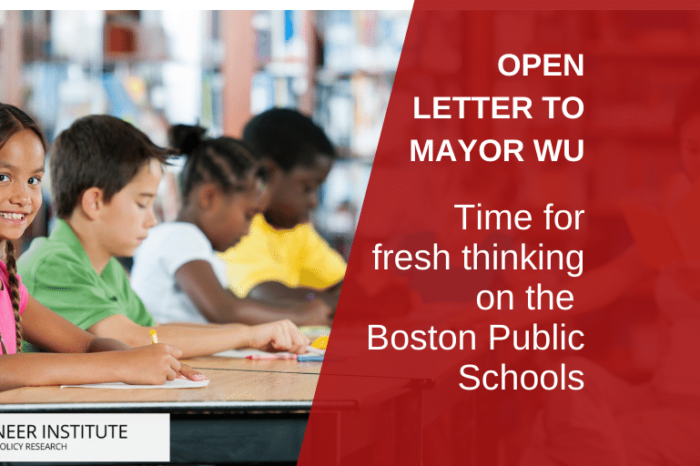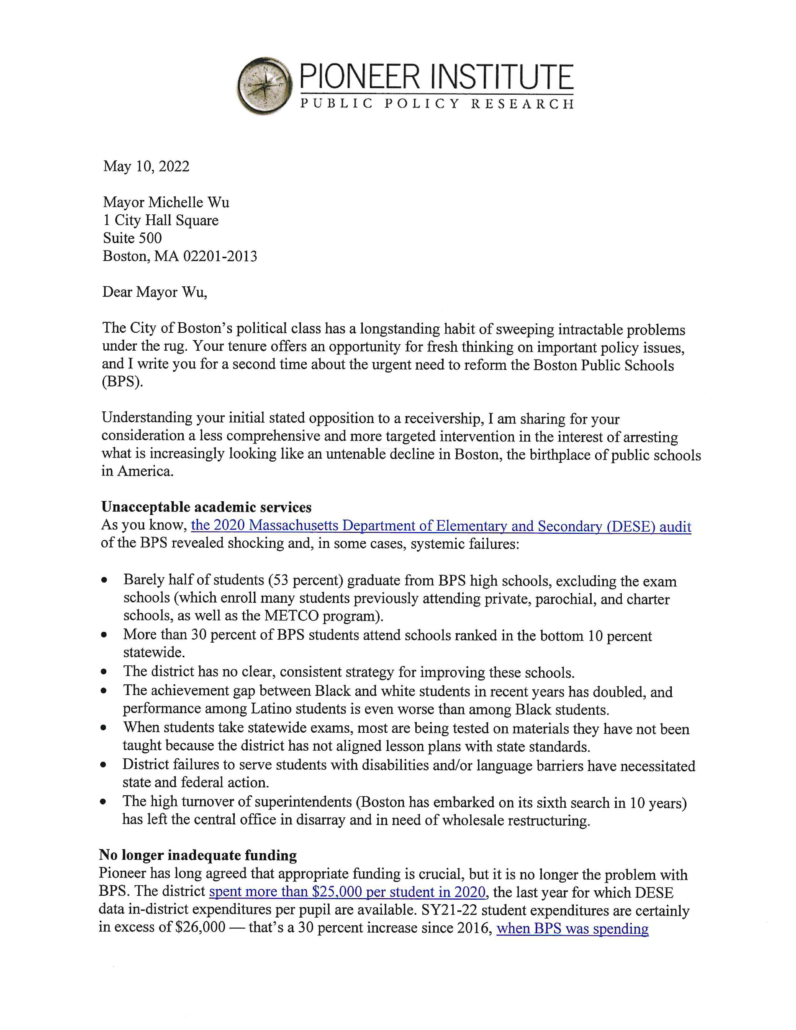Open Letter to Mayor Michelle Wu on the Boston Public Schools
/in Academic Standards, Featured, News, Related Education Blogs /by Editorial Staff Share on Facebook
Share on Twitter
Share on
LinkedIn
+
“Barely half of students (53 percent) graduate from BPS high schools, excluding the exam schools,” Pioneer Institute Executive Director Jim Stergios underscores at the start of this Open Letter to Boston Mayor Michelle Wu.
That’s just one in a long litany of troubles within the Boston Public Schools, much of which is due to chaotic management and at times even willful misleading of the public.
In this letter, Pioneer recommends fresh thinking, and, specifically, a highly focused and time-limited intervention, in partnership with the state department of education.
Get Updates on Our Education Research
Related Content:

Harvard’s Leo Damrosch on Alexis de Tocqueville & Democracy in America
This week on The Learning Curve, co-hosts Alisha Searcy of DFER and U-Arkansas Prof. Albert Cheng interview Leo Damrosch, the Ernest Bernbaum Professor of Literature Emeritus at Harvard University and author of "Tocqueville’s Discovery of America". Prof. Damrosch delves into Alexis de Tocqueville’s historic nine-month journey through the United States in 1831–1832, which inspired his masterpiece, "Democracy in America".

UK’s John Suchet, OBE, on Tchaikovsky, The Nutcracker, & Ballets
This week on The Learning Curve, co-hosts U-Arkansas Prof. Albert Cheng and Dr. Jocelyn Chadwick interview distinguished British television journalist, author, and Classic FM presenter, John Suchet, OBE. Mr. Suchet explores the life and legacy of Pyotr Tchaikovsky, one of Russia's greatest composers. He shares insights into Tchaikovsky’s upbringing, his late start in composing, and the emotional challenges that shaped his career and music.

U-OK’s Dan Hamlin on Emerging School Models & Learning Loss
This week on The Learning Curve, co-hosts Alisha Searcy of DFER and U-Arkansas Prof. Albert Cheng interview Dan Hamlin, an Associate Professor in the Department of Educational Leadership and Policy Studies at the University of Oklahoma. Prof. Hamlin offers his insights on the state of K-12 education policy and reform. He shares how his academic experiences and research shaped his philosophy on education and informed his work with Harvard PEPG’s “Emerging School Models” conference.

NYT #1 Bestseller Dava Sobel on Marie Curie & Women in Science
This week on The Learning Curve, co-hosts Alisha Searcy of DFER and U-Arkansas Prof. Albert Cheng interview Dava Sobel, acclaimed author of The Elements of Marie Curie: How the Glow of Radium Lit a Path for Women in Science. Sobel delves into the life of Marie Curie, the “scientific Joan of Arc,” exploring her extraordinary journey from clandestine education in Tsarist-controlled Poland to becoming the first woman to win two Nobel Prizes in different scientific disciplines.

Becket Fund’s Eric Rassbach on Loffman v. CA DOE, Religious Liberty, & Schooling
This week on The Learning Curve, co-hosts Alisha Searcy of DFER and U-Arkansas Prof. Albert Cheng interview Eric Rassbach, Vice President and Senior Counsel at the Becket Fund for Religious Liberty. Mr. Rassbach discusses the Loffman v. California Department of Education case, where Becket successfully secured a unanimous Ninth Circuit decision ensuring equal access to special education funding for religious school students.

CUNY’s Carl Rollyson on William Faulkner & Southern Literature
This week on The Learning Curve, co-hosts Alisha Searcy of DFER and U-Arkansas Prof. Albert Cheng interview Carl Rollyson, CUNY professor, and acclaimed biographer of William Faulkner. Prof. Rollyson offers an in-depth exploration of Faulkner’s life, work, and enduring legacy.

NH Gov. Chris Sununu on School Choice
This week on The Learning Curve, co-hosts Alisha Searcy of DFER and U-Arkansas Prof. Albert Cheng interview New Hampshire Governor Christopher Sununu. Gov. Sununu discusses his upbringing in a well-known political family and how the influence of his father, a former governor and White House chief of staff, and his brother, a former U.S. senator, has shaped his public service.

Dr. Helen Baxendale on Great Hearts Classical Liberal Arts Charter Schools
This week on The Learning Curve, co-hosts Alisha Searcy of DFER and U-Arkansas Prof. Albert Cheng interview Dr. Helen Baxendale, the chief of staff and vice president of strategy at Great Hearts Academies. Dr. Baxendale discusses how her global educational experiences inform her perspective on K-12 policy and Great Hearts’ mission to integrate the humanities, math, and science for intellectual and character development.




